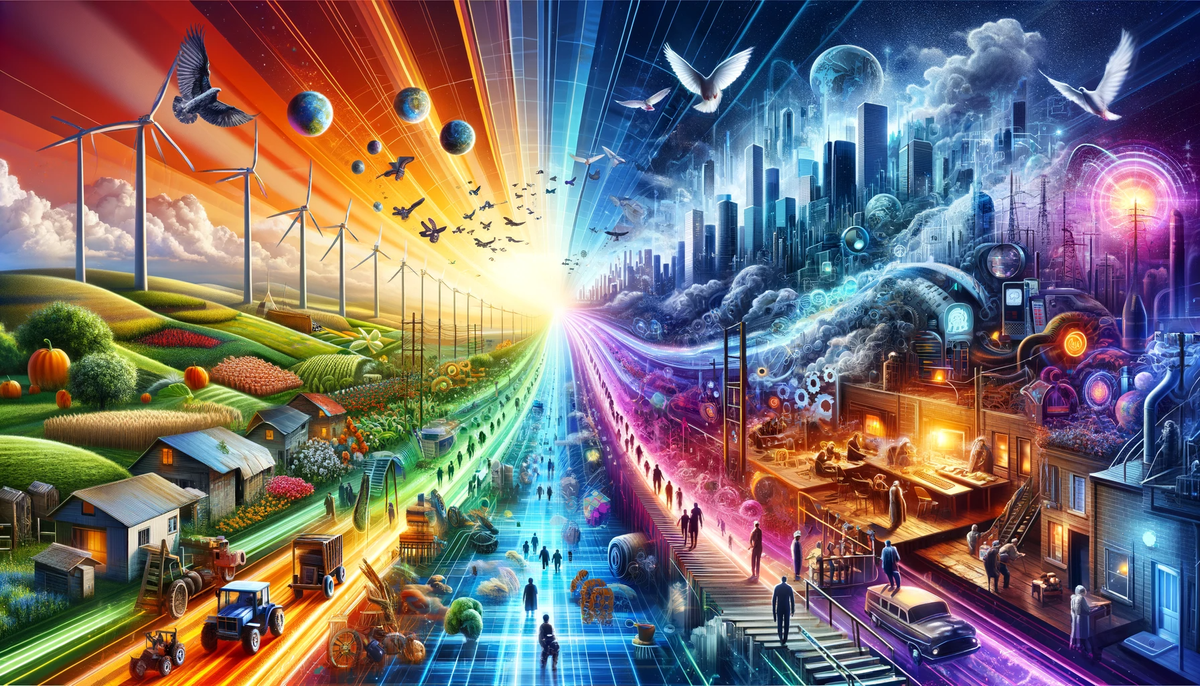How the Next Economic Revolution Is All About You

As we navigate the winding roads of human progress, we often gauge our journey by the milestones of economic shifts. Traditionally, this trek has taken us from the earthy roots of agriculture to the smoke-stacked skies of industry, eventually easing into the abstract, digital realm of services. Yet, in this ongoing evolution, there's a subtle but profound metric of progress that often escapes the spotlight: energy consumption per person. This metric is more than a mere number; it's a mirror reflecting our civilization's heartbeat, pulsing with every technological and societal leap.
Let's rewind the clock a bit. In the agricultural era, our energy consumption was relatively minimal, fueled by human and animal muscle. The Industrial Revolution cranked this up several notches, as steam engines and electricity became the dynamos of progress. Then, the service-based economy ushered us into an era of computers and internet, where the energy was not just physical but also increasingly electrical and digital.
But what's next? We stand on the cusp of a new epoch, one where the traditional notions of economy and energy are being redefined. Enter the age of GPUs (Graphics Processing Units) and attention span. This might sound like a tech-geek's dream, but it's so much more. GPUs, once the darlings of gamers and designers, are now the powerhouse behind deep learning, artificial intelligence, and vast data processing. They're not just tools; they're the engines of a new era.
This GPU-driven stage is unique because it converges the digital, physical, and even cognitive aspects of our lives. Our attention span, often chastised for its butterfly-like fluttering, becomes a precious commodity. In a world awash with information, the ability to capture and maintain attention is gold.
So, what does this mean for the companies and industries of tomorrow? The winners in this new landscape will be those who master the art of leveraging GPUs and attention spans in harmony. Think of businesses that combine AI's analytical prowess with immersive, attention-grabbing experiences. We're talking about companies that can sift through the ocean of data to present us with pearls of personalized content, services, and experiences.
Imagine streaming services that not only recommend the perfect show but also adapt their interface and content based on your mood and attention patterns. Consider AI-driven educational platforms that adjust their teaching methods in real-time, keeping students engaged and maximizing learning efficiency. Or envision healthcare providers using advanced algorithms to deliver personalized health plans, tailored to each individual's genetics, lifestyle, and even attention span.
In this brave new world, the traditional metrics of economic success – production, revenue, growth – remain relevant but are complemented by new yardsticks: engagement, personalization, and cognitive resonance. The companies that understand this will not just survive; they'll thrive, leading the charge into an era where energy consumption per person reflects not just how much we use, but how wisely and effectively we use it.
In conclusion, as we embrace this GPU and attention-centric phase, our progress as a civilization will be marked by how we harness and utilize energy – not just in gigawatts or terawatts, but in the nuanced interplay of technology, mind, and society. It's a thrilling time to be alive, standing at the frontier of an era where our attention isn't just a passive state of mind, but a dynamic force shaping the very fabric of our economy and progress.
(GPT4, 20231220, image requested in followup prompt "provide image")
write a blog post about how progress can be measured by energy consumption/person, humanity has gone through drastic economic changes evolving from agricultural to industrial to service based economy. Hypothesise about how the next stage is about GPUS and our attention span and what types of companies will be more successful. Make the post fluid and punchy, no title sections